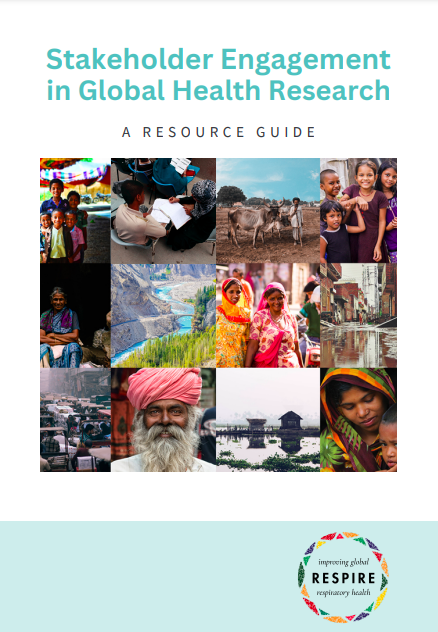In September 2023, the NIHR-funded Global Health Research Unit on Respiratory Health (RESPIRE) launched the 'Stakeholder Engagement in Global Health Research' resource guide.
This resource guide has been co-produced by the RESPIRE research partners and stakeholder engagement champions from Bangladesh, India, Malaysia and Pakistan. Champions are designated and dedicated professionals in each partner organisation, driving the community and stakeholder engagement activities aligned with the research studies to ensure that the research is implemented using local knowledge and experiences and is translated into practice.
This guide outlines the five essential steps of stakeholder engagement (see below), constituting a continual process for developing and sustaining meaningful relationships with stakeholders including patients, community members and leaders, frontline healthcare workers and healthcare providers, as well as policy makers and non-state actors:
- Understanding the significance of stakeholder engagement
- Mapping and prioritising stakeholders
- Planning and budgeting for stakeholder engagement
- Implementing stakeholder engagement
- Monitoring and evaluating stakeholder engagement
 Based on the field experiences of the RESPIRE partners, this guide provides simple tools and templates for developing, implementing and evaluating stakeholder engagement plans tailored to local contexts and linked with planned outcomes. The guide presents country case studies describing innovative community engagement strategies such as puppet shows and virtual runs for asthma awareness; it also discusses the challenges and ethical considerations when engaging stakeholders and potential ways to address these.
Based on the field experiences of the RESPIRE partners, this guide provides simple tools and templates for developing, implementing and evaluating stakeholder engagement plans tailored to local contexts and linked with planned outcomes. The guide presents country case studies describing innovative community engagement strategies such as puppet shows and virtual runs for asthma awareness; it also discusses the challenges and ethical considerations when engaging stakeholders and potential ways to address these.
Additionally, this guide provides guidance for researchers and development professionals writing grant applications for global health research funding, offering them a roadmap to conceptualise, plan, and budget their stakeholder engagement approaches. This resource can be used and adapted for your practice.
This work is licensed under a Creative Commons Attribution 4.0 International License and was funded by the UK National Institute for Health and Care Research (NIHR) (Global Health Research Unit on Respiratory Health (RESPIRE); 16/136/109) using UK aid from the UK Government to support global health research. The views expressed in this publication are those of the author(s) and not necessarily those of the NIHR or the UK Government.

Please Sign in (or Register) to view further.